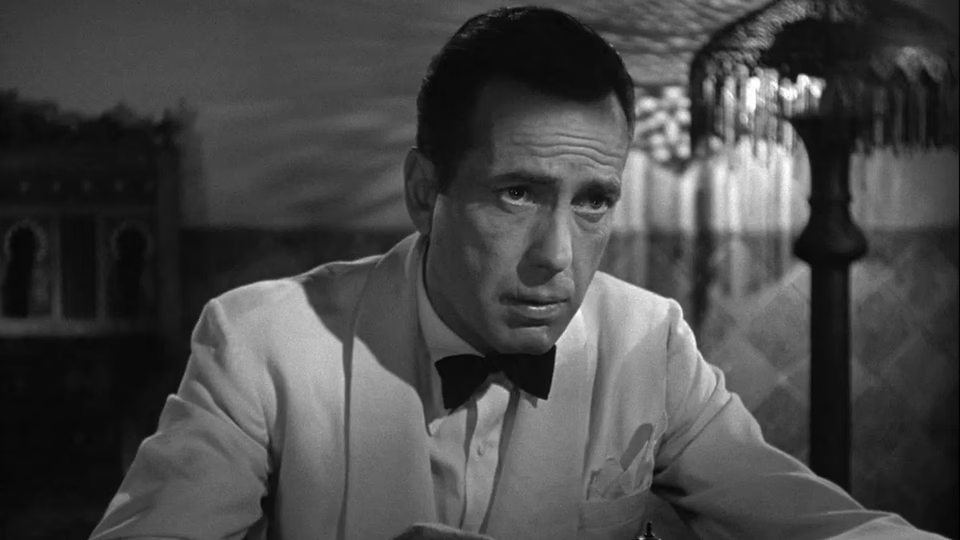Casablanca

By the time I watched Casablanca, I already knew every line of dialogue.
During my senior year of high school, I worked at Suncoast, a non-rental video store that sold VHS and Laserdisc movies.
On monitors mounted throughout the store, we’d show whatever clamshelled, family-friendly title corporate was pushing—think Free Willy.
During the holiday season, corporate would ship washing-machine-sized boxes of product for us to stock. Nothing stayed in the back room so we’d be there—well past midnight—stacking copies of The Bodyguard and Sister Act.
While we worked, we’d put on a movie. The monitors would be off, but we’d listen. Casablanca proved an employee favorite on those long nights. Though I’d never seen it, I loved the crackling dialogue. Lines like: “It would take a miracle to get you out of Casablanca and the Germans have outlawed miracles.”
The story takes place during World War II in Casablanca. We meet Rick, an American expatriate played by Humphrey Bogart. He runs the most popular café in town. As Louis, the venal Prefect of Police played by Claude Rains, says, “Everybody comes to Rick’s.”
Rick maintains a cool detachment from everything and everyone. That changes once long-lost flame Ilsa (played by Ingrid Bergman) walks in on the arm of Victor Laszlo, a resistance leader wanted by the Germans.
Seeing Ilsa shakes Rick from his isolationist stance, and soon he’s abetting the local resistance. The Germans retaliate by insisting Louis shut down the café. Amid the chaos of the police chasing everyone out, Rick demands an explanation:
LOUIS I’m shocked, SHOCKED, to find gambling going on here!
(A croupier approaches with a large wad of cash)
CROUPIER Your winnings sir.
LOUIS Oh, thank you, very much!
That’s not just funny, it’s Billy Wilder funny.
But the film pivots with ease. Grounded in relatable emotions, the melodrama packs a punch. Consider how Rick spits venom at Ilsa, saying: “Well, I guess neither one of our stories is very funny. Tell me, who was it you left me for? Was it Laszlo, or were there others in between or… aren’t you the kind that tells?”
No weepy speeches, just relatable emotion setup by an earlier scene between a drunken Rick and his piano-playing friend, Sam:
SAM: Let’s get outta here.
RICK: No Sam, I’m waiting for a lady.
SAM: Please boss, let’s go. Ain’t nothing but trouble for you here.
RICK (staring at the liquor in front of him): She’s coming back. I know she’s coming back.
SAM: We’ll take the car. We’ll drive all night. We’ll get drunk. We’ll go fishing and stay away until she’s gone.
RICK (not looking at Sam): Shut up and go home, will ya?
SAM: No sir, I’m staying right here.
Great lines abound but some of the film’s best moments are visual. I didn’t discover them until years later, when I finally sat down and watched the film. Nice touches like when the waiter checks his pockets after the pickpocket bumps him. Or the beat-perfect editing between Rick and Louis during the finale.
And let’s talk about that ending. Rick sends the love of his life away and goes off to a likely death. Happy? Hardly. Noble? Absolutely. Rick sacrifices his and Ilsa’s happiness for the greater good that is Victor Lazlo. In an era where studios were allergic to unhappy endings, it’s amazing this one went over.
Further, it’s impressive how the script doesn’t have Ilsa waffle, even when she believes Rick has betrayed Victor. This casts her in an unflattering light, but her fallibility makes her relatable.
And it’s the surprising punch that ending packs that makes the movie. In a film overflowing with choice one-liners, iconic performances, and crisp direction, the shock of the untidy, bitter-sweet ending resonates, reinforcing the film’s themes of nobility and sacrifice that transcend wartime propaganda. A true classic in every sense of the word.